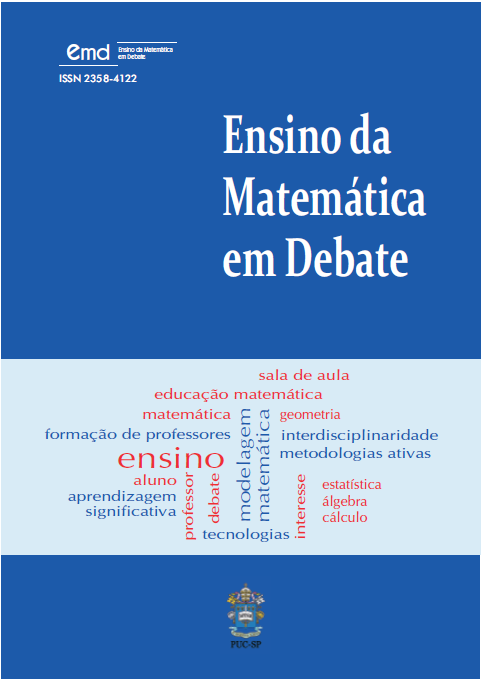Docência e Aprendizagem de Matemática: humanos e não humanos
Palavras-chave:
Epistemologia do professor, Aprendizagem, Aprendizagem “matemática” de mamíferos, Papéis de professor e alunoResumo
O texto apresenta a terceira parte da pesquisa Epistemologia do Professor de Matemática, cujos dados foram coletados no Peru, no Chile e no Uruguai, mediante entrevistas a 17 professores. O objetivo é o de identificar as concepções epistemológicas que fundamentam o ensino de Matemática e verificar se tais concepções assemelham-se às encontradas no Brasil: empiristas, fundamentadas por aprioristas e raras construtivistas. Os objetivos específicos são saber como os docentes explicam as capacidades de aprendizagem de seus alunos, cotejando-as com as de mamíferos não humanos, as dificuldades de aprendizagem e como compreendem as funções de professor e de aluno na sala de aula. Analisam-se, para isso, as respostas às questões 9 a 11, dentre as 24 da pesquisa, feitas a docentes de todos os níveis de ensino. Como nas análises anteriores, as respostas obtidas assemelham-se às de docentes brasileiros quanto à predominância de concepções epistemológicas empiristas, fundadas por aprioristas, sem consciência da contradição, e raras construtivistas que aparecem esparsas. A afirmação de que as capacidades racionais são a priori ou inatas e o ensino, formal ou informal, as aperfeiçoa é recorrente; nada aparece que dialetize hereditariedade e meio. Evidencia-se contexto propício para se confundir percepção e razão, atribuindo àquela o que é próprio desta. Dali a dificuldade de distinguir matemática humana de “matemática” de outros mamíferos. Desfazem-se, por isso, concepções de aprendizagem e de ensino que valorizem a ação constitutiva do sujeito epistêmico. Os dados afirmam a hegemonia do ensino frente à aprendizagem. A referência teórica básica é a Epistemologia Genética. A pesquisa é qualitativa, de tipo exploratória, e os dados são organizados de acordo com categorias retiradas das respostas dos docentes tendo em vista suas concepções epistemológicas: empirismo, apriorismo, construtivismo.
Referências
ABBAGNANO, Nicola. Dicionário de Filosofia. São Paulo: Ed. Mestre Jou, 1970.
BACHELARD, G. A formação do espírito científico; contribuição para uma psicanálise do conhecimento. Tradução: Estela dos Santos Abreu. 5ª reimp. Rio de Janeiro: Contraponto, 1996. Disponível em: file:///C:/Users/Lenovo/AppData/Local/Temp/BACHELARD,%20G.%20A%20Forma%C3%A7%C3%A3o%20do%20Esp%C3%ADrito%20Cient%C3%ADfico.pdf)
BECKER, F. Gênese de Noções Matemáticas Elementares: concepções epistemológicas subjacentes às respostas de docentes de Matemática de três países sulamericanos. Bolema: Boletim de Educação Matemática [online]. v. 35, n. 70, p. 588-613, ago. 2021. Disponível em: <https://doi.org/10.1590/1980-4415v35n70a03>.
BECKER, F. A epistemologia do professor: o cotidiano da escola. 16ª ed., 3ª reimp., Petrópolis: Vozes, 2020.
BECKER, Fernando. Construção do conhecimento matemático: natureza, transmissão e gênese. Bolema – Boletim de Educação Matemática. Rio Claro, v. 33, n. 65, p. 963-987, dez. 2019. Disponível em: http://www.scielo.br/bolema
BECKER, F. Abstração pseudo-empírica: significado epistemológico e impacto metodológico. Educação & Realidade. Porto Alegre, v. 42, n. 1, p. 371-393, jan./mar. 2017.
BECKER, F. Tomada de consciencia: del hacer al compreender. In: FRISANCHO HIDALGO, Susana. Ensayos constructivistas. Lima: Fondo Editorial PUC/Peru, 2016. p. 77-90
BECKER, F. Sujeito do conhecimento e ensino de Matemática. Schème, Revista Eletrônica de Psicologia e Epistemologia Genéticas. Marília: UNESP, v. 5, p. 65-86, set. 2013.
BECKER, F. Educação e construção do conhecimento. 2ª ed. Porto Alegre: Penso, 2012a.
BECKER, F. A epistemologia do professor de Matemática. Petrópolis: Vozes, 2012b.
DOLLE, J.-M. Princípios para uma pedagogia científica. Tradução: Sandra Loguércio. Porto Alegre: Penso, 2011.
FREIRE, P. Conscientização; teoria e prática da libertação. São Paulo: Cortez & Moraes, 1979.
NUNES, T. & BRYANT, P. Crianças fazendo Matemática. Porto Alegre: Artes Médicas, 1997.
PIAGET, J. O nascimento da inteligência na criança. Tradução: Álvaro Cabral. Rio de Janeiro: Zahar, 1978a.
PIAGET, J. A formação do símbolo na criança; imitação, jogo e sonho; imagem e representação. Rio de Janeiro: Zahar, 1978b.
PIAGET, J. A inteligência e a percepção. In: ______. Psicologia da inteligência. 2. ed. Tradução: Egléa de Alencar. Rio de Janeiro: Ed. Fundo de Cultura, 1972.
PIAGET, J. & GRÉCO, P. Aprendizagem e conhecimento. Tradução: Equipe da Livraria Freitas Bastos. Rio de Janeiro: Freitas Bastos, 1974a.
PIAGET, J. Para onde vai a educação. Tradução: Ivette Braga. Rio de Janeiro: Liv. J. Olympio Ed., 1974b.
PIAGET, J. Les mécanismes perceptifs. Paris: Presses Universitaires de France, 1961.
PIAGET, J. & SZEMINSKA, A. A gênese do número na criança. Tradução: Cristiano Monteiro Oiticica. Rio de Janeiro: Zahar, 1975.
PIAGET, J. A tomada de consciência. Tradução: Edson Braga de Souza. São Paulo: EDUSP/ Melhoramentos, 1977a.
PIAGET, J. Fazer e compreender. Tradução: Christina Larroudé de Paula Leite. São Paulo: EDUSP/ Melhoramentos, 1977b.
PIAGET, J. Abstração reflexionante; relações lógico-aritmética e ordem das relações especiais. Tradução: Fernando Becker e Petronilha B. G. da Silva. Porto Alegre: Artes Médicas, 1995.
RAMOZZI-CHIAROTTINO, Z. Em busca do sentido da obra de Jean Piaget. São Paulo: Ática. 1984.
UNESCO. Unesco: Pandemia acelerou a exclusão escolar em países pobres. 23/06/2020 Disponível em: https://noticias.r7.com/educacao/unesco-pandemia-acelerou-a-exclusao-escolar-em-paises-pobres-29062022
UNESCO. Unesco avisa que, em todo o mundo, 117 milhões de estudantes ainda estão fora da escola. Set. 2021. Disponível em: https://pt.unesco.org/news/unesco-avisa-que-em-todo-o-mundo-117-milhoes-estudantes-ainda-estao-fora-da-escola
Downloads
Publicado
Como Citar
Edição
Seção
Licença
Copyright (c) 2022 Ensino da Matemática em Debate

Este trabalho está licenciado sob uma licença Creative Commons Attribution-NonCommercial 4.0 International License.

Este obra está licenciado com uma Licença Creative Commons Atribuição 4.0 Internacional.






